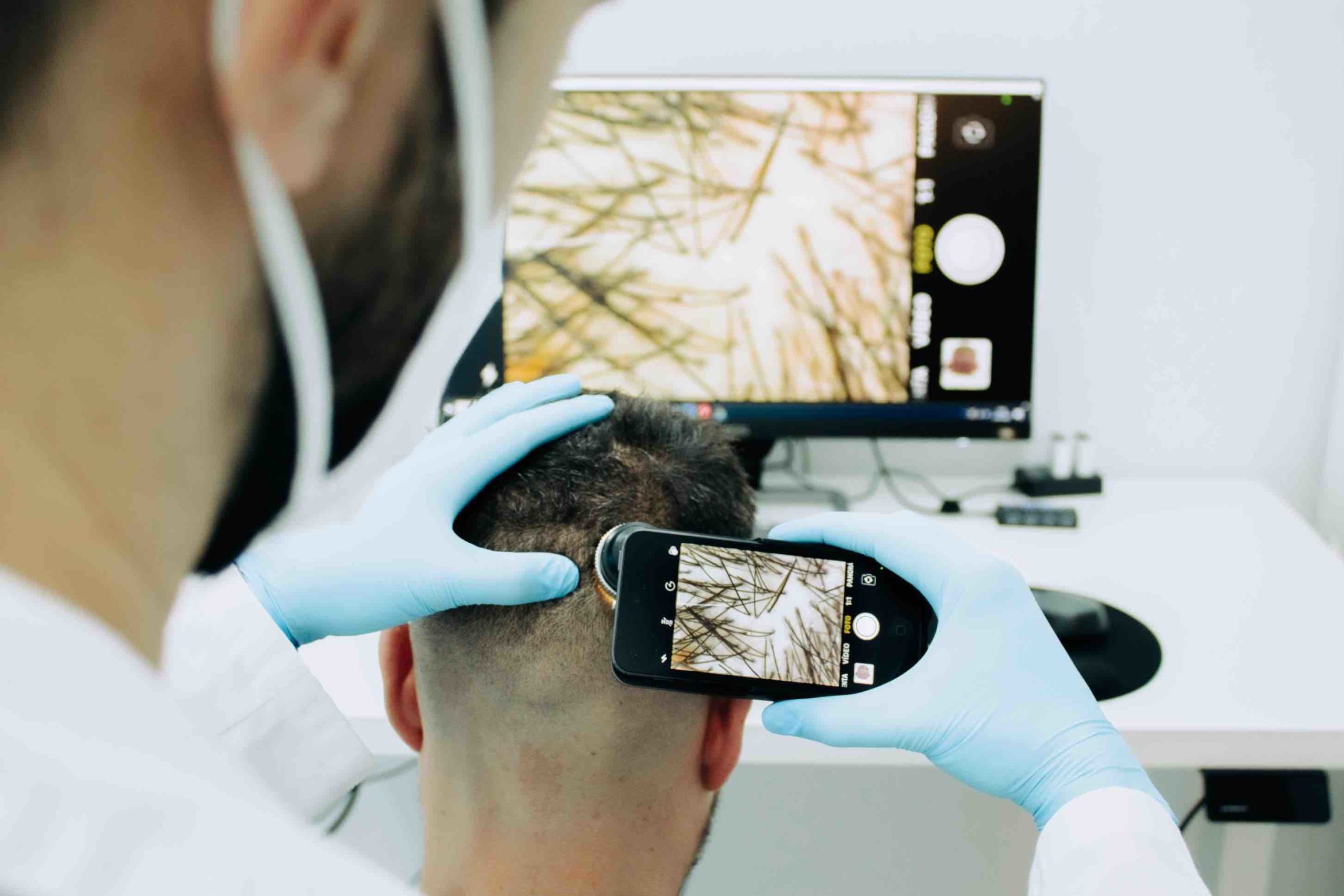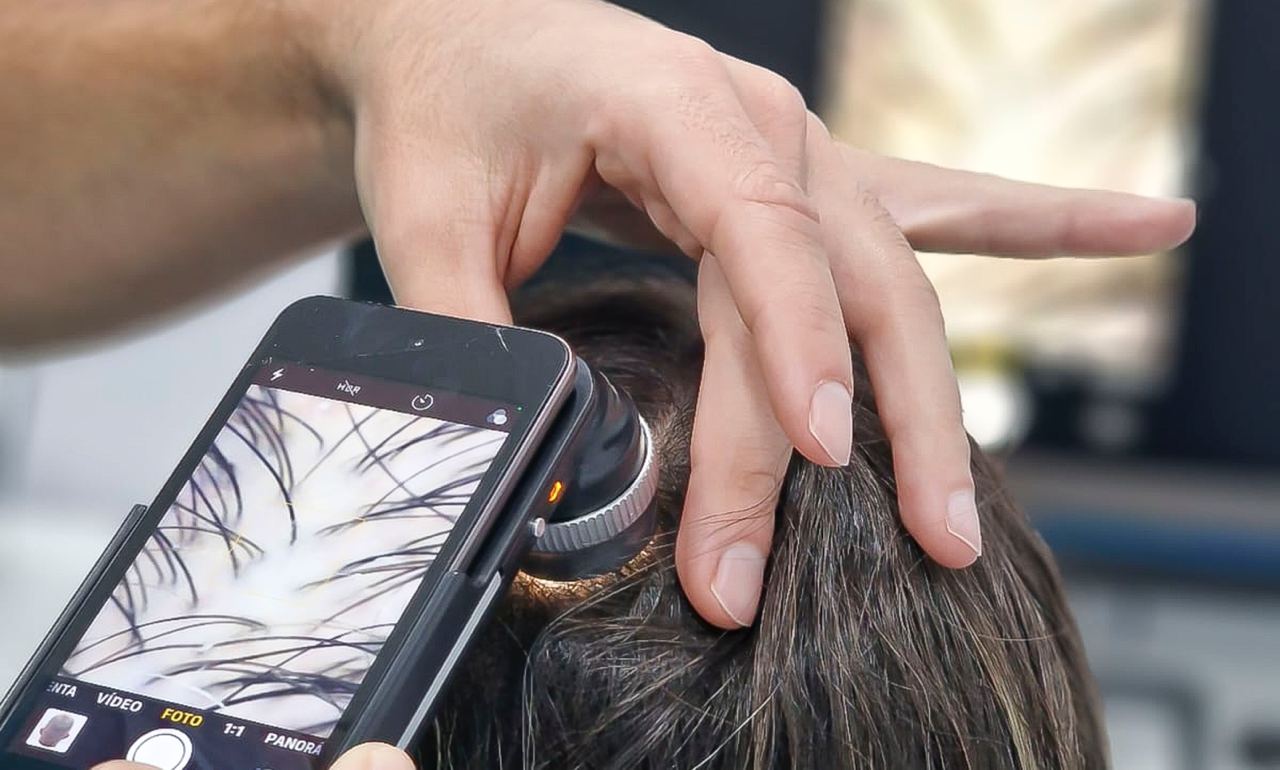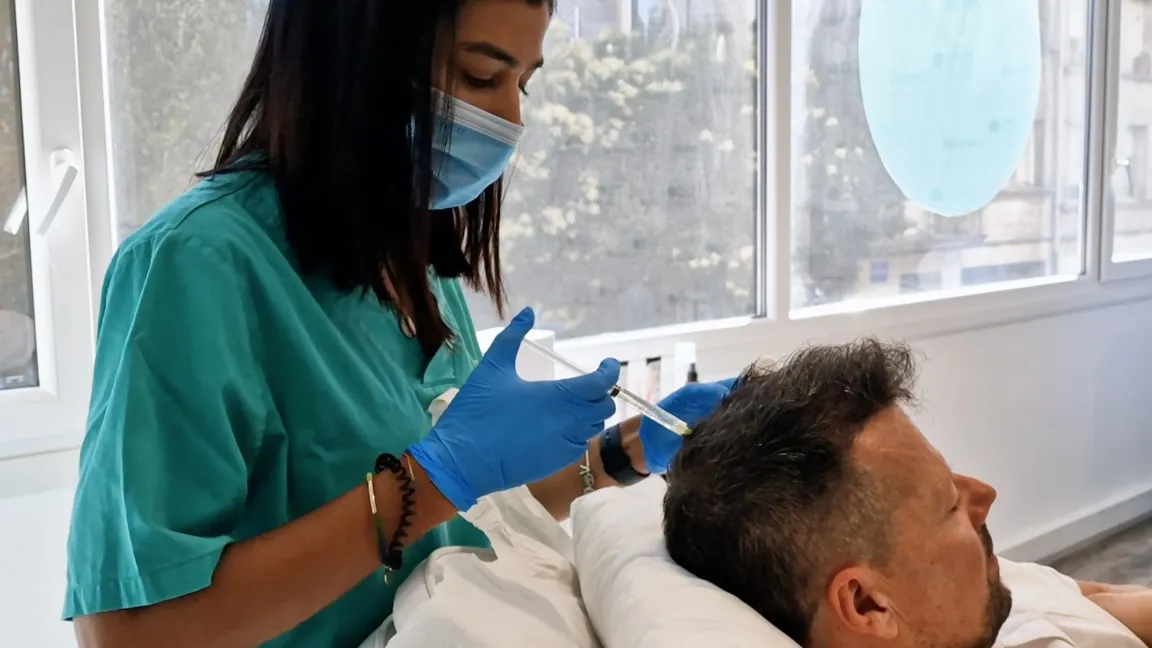
Hair loss is a problem faced by more than half of the population and affects both men and women. In many cases it is a normal hair loss, since on average we lose 100 hairs a day due to the hair life cycle. This is completely normal and the hair that falls out will come back, so it does not represent a notable hair problem or alopecia. However, there are other types of hair loss in which it is important to identify its causes and symptoms to start with the most appropriate treatment or, otherwise, it will cause baldness.
Knowing when it is necessary to go to a hair clinic for hair loss is essential to avoid a greater visual impact. From Hospital Capilar We tell you what are the main causes of hair loss, the types of hair loss that require medical treatment and how to identify its symptoms.
Identifying the causes of hair loss is key to knowing how to stop the progression of hair loss. Depending on the cause that triggers hair loss, the pattern of hair loss and symptoms vary, and it is with this indicator that specialist doctors identify the cause. type of alopecia or hair loss being treated.
Our medical team identifies genetic inheritance as one of the most common causes of alopecia. If we have a bald history or hair loss problems, we have a greater predisposition to suffer hair loss. Normally, hair loss due to genetic causes generally occurs progressively and in most cases it is a androgenic alopecia.
Some hormonal disorders have a strong impact on the Hair follicles. Again, in the majority of these cases where there is a hormonal component, it is androgenic alopecia. Specifically, patients with androgenic alopecia have an unusual hormonal activity in which testosterone, the male sex hormone, is converted into Dihydrotestosterone due to the activity of the enzyme 5 alpha reductase. Dihydrotestosterone attacks hair follicles, causing them to miniaturization and subsequent fall, generating baldness. Therefore, our doctors They point out that this type of hair loss is not reversible, that is, the hair that falls will not grow back.
Hair loss in women is more pronounced when there is a notable hormonal alteration, such as during pregnancy, in the postpartum or during the menopause. In these cases, the hormonal imbalance typical of pregnancy or menopause affects the life cycle of the hair, shortening it and causing hair loss.
There are immunological diseases such as lupus or types of alopecia of autoimmune origin, such as alopecia areata, which cause hair loss and even cause bald spots. In these cases, it is the patient's own immune system that, by mistake, attacks the hair follicles, causing hair loss.
Some medications and medical treatments have hair loss as a side effect. Some examples of them are those used to treat cancer, depression, circulatory and heart problems, among others.
Una bad nutrition It entails nutritional deficiencies that, in many cases, will impact the health of the hair follicles. Follicles need a series of nutrients to stay healthy and function correctly, such as vitamins, minerals and iron, among others. When we do not incorporate foods such as legumes, vegetables, fruits, oily fish, cereals and nuts, there will be a vitamin deficiency that will lead in many cases to telogen effluvium. Thus, patients with anemia They can suffer noticeable hair loss due to a lack of iron in their body.
There is a phenomenon known as seasonal fall in which hair falls in large quantities and diffusely during the change of season or in very specific times, such as autumn. Our specialist doctors explain that this occurs naturally because a large part of the follicles enter their telogen or shedding phase. This has its explanation since, like all mammals, humans shed their hair to adapt to changes in temperature.
Live strong episodes of Stress It has an impact on hair health. According to our medical team, maintaining high levels of stress generates an increase in cortisol, a steroid hormone produced in the adrenal gland that is released in stressful situations and when there are low levels of glucose, regulating carbohydrate metabolism. In these cases, our body enters a state of alert in which it concentrates vitamins and nutrients in essential places to defend itself, providing these nutrients in smaller quantities in other dispensable places such as the hair. This shortens the life cycle of the hair, generating hair loss in the form of telogen effluvium.
A poor hair care routine can promote hair loss. Some bad habits include the abuse of tight hairstyles where there is intense pulling on the hair. This excess tightness weakens the hair follicles, causing the hair to fall out and potentially triggering, in the most serious cases, a traction alopecia.

What we should base on to know when to go to a specialized hair clinic is the pattern of hair loss and the symptoms that accompany hair loss. In this way, the type of alopecia in question is determined and, consequently, the treatment that will need to be followed.
For hair loss to be considered normal, about 100 hairs should fall out daily. When hair loss is more intense and exceeds this figure, but occurs diffusely, that is, it is not concentrated in a specific area of the scalp, generating baldness, there is a high probability that it is telogen effluvium. It normally affects women, although there are also cases in men, and it usually accompanies lack of volume and density, and many patients identify an obvious symptom: that the pigtails are thinner. This hair loss is in most cases reversible and does not require medical treatment at first, since once the cause of hair loss has been overcome (stress, poor diet, seasonal hair loss...), the hair will stop falling. approximately 6 months.
If hair loss persists and we lose an excessive amount of density, it is advisable to go to a specialist to receive medical treatment that improves the condition of the hair and accelerates the growth of new hair.
When the hair begins to become significantly finer, in most cases it is an indicator of a hair miniaturization. This is the first symptom of androgenic alopecia in both men and women, which causes baldness, so it is highly recommended to go to a specialized hair clinic. In these cases, it is necessary to begin medical treatment to stabilize the alopecia.
En of, one of the obvious symptoms of alopecia is widening of the hairline. When the hair parting becomes wider, it is advisable to go to an expert, as this is an obvious sign of androgenic alopecia. Again, this type of alopecia requires medical treatment and, therefore, it is important to go to a hair clinic in Spain to receive a medical assessment.
In the case of men, it is more common for baldness due to androgenic alopecia to begin and be more evident in the area of the receding hairline and crown of the head. If you do not receive medical treatment, alopecia continues to progress until you only have hair in a small strip on the back of your head.
When hair loss is accompanied by the appearance of rounded bald patches on the scalp, it is necessary to see a dermatologist as it is an obvious symptom of alopecia areata.

According to our specialist doctors, alopecia cannot be prevented as such. Today's treatments are aimed at slowing its progression once it has been developed. Therefore, it is not possible to prevent alopecia.
However, Yes, we can incorporate certain habits to take care of our hair and avoid considerable hair loss. like telogen effluvium. It is important to take care of your diet by incorporating foods rich in vitamins B, C and E, as well as biotin, zinc and iron. To do this, it is advisable to incorporate foods such as vegetables, legumes, eggs, fruit, oily fish, cereals and nuts, among others.
On the other hand, following a good hair care routine is also beneficial to prevent hair loss. Thus, it is recommended not to abuse heat sources such as irons and dryers, reduce the use of dyes and apply specific hair products for our hair type or anti-hair loss products.
Nowadays, thanks to advances in hair medicine, it is possible to stop the progression of alopecia and treat hair loss effectively. For this, a prior medical evaluation is important, especially in cases in which hair loss gives way to hairless areas, to know which is the most effective treatment in each case.
Vitamin and nutritional supplements are good allies to take care of your hair, especially in the long term. In cases of nutritional deficiencies, they are highly recommended to solve this nutritional deficiency.
Anti-hair loss shampoos, as well as other types of topical treatments, are also a good option, especially for people with moderate hair loss. In patients with alopecia, this type of product can serve as a complement to other treatments or drugs, but not as the only remedy since it will not have the same effect.
In cases of alopecia such as androgenic or areata, the use of pharmacological treatment is essential to stabilize it. The oral drugs most used in androgenic alopecia are Finasteride and Minoxidil, although this can be topical too. On the other hand, in alopecia areata, corticosteroids or immunotherapy are usually chosen.
On the other hand, there are hair treatments who practice hair clinics in Spain to stop hair loss and promote hair growth. They are highly effective and require prior medical evaluation.
El Platelet Rich Plasma, or PRP, is one of the most in-demand hair treatments today. Promotes hair regeneration, stops hair loss and improves hair quality. This is achieved thanks to plasma enriched with growth factors that is obtained by centrifuging a small amount of blood taken from the patient. This plasma is applied to the scalp through subdermal infiltrations.
La hair mesotherapy It is another of the most widespread treatments. By applying a subdermal application to the scalp of a combination of a vitamin cocktail with drugs adapted to the patient, hair loss can be stopped, especially in patients with androgenic alopecia.
Hair treatments stabilize alopecia and stop hair loss, but they will not cause new hair to grow in those areas where it stopped growing naturally. He hair graft It is the solution for these cases, in fact it is the only method currently by which it is possible to recover hair that has fallen due to alopecia.

Stop the progression of alopecia and recover your hair in Hospital Capilar from the hands of doctors who specialize in hair transplants. Request your hair diagnosis at no cost and put yourself in the best hands!
Sanitary Reg. No. Pontevedra: C-36-003121 Sanitary Reg. No. Madrid: C517593 Sanitary Reg. No. Murcia: 40004094


Copyright © 2021 - Legal Notice and Privacy Policy - Cookies policy